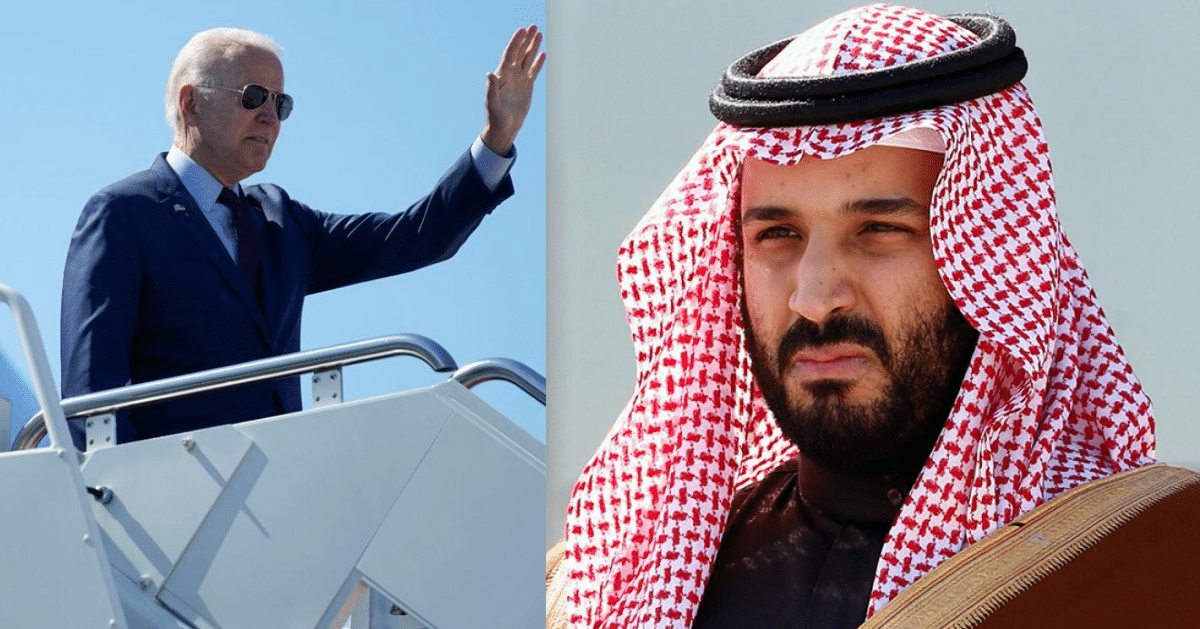By Team MEB
The White House announced that US President Joe Biden will visit Saudi Arabia, the West Bank and Israel from July 13. A day after the announcement, the District of Columbia announced it was renaming the street in front of the Saudi embassy as “Jamal Khashoggi Way”. This announcement has been deemed a betrayal by human rights advocates and civil society groups considering Saudi Arabia’s grave human rights abuses. However, Biden’s administration has attempted to downplay its change in its stance toward Saudi Arabia in a bid to lower global oil and gas prices.
Biden’s tone regarding Saudi Arabia has changed drastically, as a presidential candidate he promised to make them a “pariah” in response to the assassination of prominent dissident Saudi writer Jamal Khashoggi. Biden also repeatedly condemned Saudi Arabia’s human rights records and even questioned selling weapons to them. During the first weeks of his presidency, Biden approved the release of an intelligence report which blamed the crown prince and de facto leader of the kingdom, Mohammed bin Salman (MBS) for his death.
The report stated that “Since 2017, the Crown Prince has had absolute control of the Kingdom’s security and intelligence organizations, making it highly unlikely that Saudi officials would have carried out an operation of this nature without the Crown Prince’s authorization”. Biden’s approval for the report’s release signalled to many his willingness to hold the government accountable after former President Trump had suppressed the report’s release, ignoring the legal requirements and assessment of America’s intelligence professionals. Since permitting the report’s release, Biden has done little to punish MBS despite his repeated promises to put human rights at the centre of his foreign policy.
In fact, Biden has increased cooperation with Saudi Arabia on a range of issues. After Saudi Arabia reportedly intercepted a missile attack launched by Houthi rebels in Yemen, the US State Department reaffirmed its “strategic defence partnership” with Riyadh in February. In early June, Biden thanked Saudi Arabia for its “courageous leadership” in assisting to implement the truce of the conflict in Yemen.
The lack of Biden’s punitive actions on Saudi Arabia can be attributed to his unwillingness to jeopardize relations with MBS who is still only in his mid-thirties and has the potential to lead the oil-rich kingdom over the next decades. While Biden has sought to defend his upcoming trip by trying to convince Americans that he is trying to help tame global oil prices and lower the cost of gas, this trip represents Biden’s bow to realpolitik in wake of the Russia-Ukraine war. Even if Biden manages to persuade MBS for more oil, the Saudis will also likely ask for weapon sales. With global outrage still looming after Khashoggi’s murder, Congress is unlikely to approve such sales. Saudi Arabia is also expected to seek security assurances from the US relating to Iran and the Houthi movement. With Biden expected to fly to Israel via Jedda, a route which is rarely used due to the requirement of Saudi approval, Biden is also expected to utilize the visit to encourage the normalization of relations with Israel.
While oil and domestic economic pressure have likely played a large part in Biden’s decision to travel to Saudi Arabia, Biden is going to struggle to sell the notion back home that Saudi Arabia remains a key player in the global energy markets despite their human rights abuses. With the Saudis likely to remain resentful of Biden given the release of the Khashoggi report and their removal of listing of Yemen’s Houthi rebels as a terrorist group, MBS is unlikely to make any significant adjustments on the price front.



















